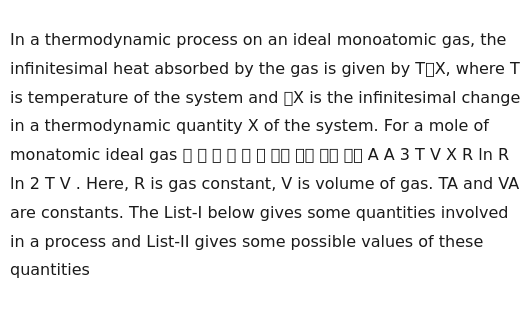Question
Question: In a thermodynamic process on an ideal monoatomic gas, the infinitesimal heat absorbed by the gas is...
In a thermodynamic process on an ideal monoatomic gas, the infinitesimal heat absorbed by the gas is given by TX, where T is temperature of the system and X is the infinitesimal change in a thermodynamic quantity X of the system. For a mole of monatomic ideal gas A A 3 T V X R ln R ln 2 T V . Here, R is gas constant, V is volume of gas. TA and VA are constants. The List-I below gives some quantities involved in a process and List-II gives some possible values of these quantities

X is the entropy (up to an arbitrary additive constant).
Solution
For a reversible process the heat absorbed is given by
δQrev=TdS.In the problem, the heat is given by
δQ=TdX.Thus, by comparing the two, we see that
dX=dS,which means that X and S differ only by a constant (i.e. X=S+ constant).
For one mole of a monatomic ideal gas the change in entropy is
ΔS=23Rln(TAT)+Rln(VAV)=Rln[(TAT)23VAV].This exactly matches the given expression for X (apart from the constant which is arbitrary).
Thus, X is essentially the entropy of the system.
